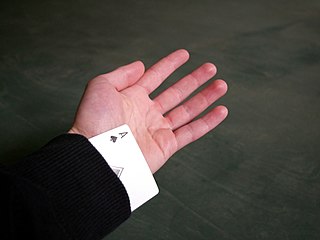
Cheating in poker is any behavior outside the rules of poker that is intended to give an unfair advantage to one or more players.

The Lord of the Rings Trading Card Game is an out-of-print collectible card game produced by Decipher, Inc. Released November 2001, it is based on Peter Jackson's The Lord of the Rings film trilogy and the J. R. R. Tolkien novel on which the films were based. Decipher also had the rights to The Hobbit novel but did not release any cards based on it. In addition to images taken from the films, in 2004 Weta Workshop produced artwork depicting characters and items from the novel absent from the films for use on cards. In 2002, LOTR TCG won the Origins Awards for Best Trading Card Game of 2001 and Best Graphic Presentation of a Card Game 2001. Decipher's license to The Lord of the Rings expired on July 30, 2007, after which all official promotion and distribution of the game stopped.

The Star Trek Customizable Card Game is an out-of-print collectible card game based on the Star Trek universe. The name is commonly abbreviated as STCCG or ST:CCG. It was first introduced in 1994 by Decipher, Inc., under the name Star Trek: The Next Generation Customizable Card Game. The game now has two distinct editions, though both forms of the game have many common elements.

Card counting is a blackjack strategy used to determine whether the player or the dealer has an advantage on the next hand.
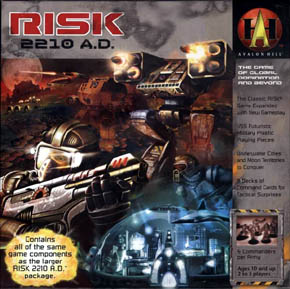
Risk 2210 A.D. is a 2–5 player board game by Avalon Hill that is a futuristic variant of the classic board game Risk. Risk 2210 A.D. was designed by Rob Daviau and Craig Van Ness and first released in 2001. In 2002, it won the Origins Award for "Best Science Fiction or Fantasy Board Game of 2001".
A metagame is a game about a game, or an approach to playing a game. A metagame can serve a broad range of purposes, tied to the way a game relates to various aspects of life.
Gameplay of the collectible card game Magic: The Gathering is fueled by each player's deck of cards, which constitute the resources that player can call upon to battle their opponents in any given game. With more than 20,000 unique cards in the game, a considerable number of different decks can be constructed. Each card is designed to have certain strengths and therefore a significant part of the game is determined by which cards a player chooses to include in their deck. Broadly speaking, decks can be loosely classified based on their play style and mode of victory. The game's designers often explicitly create cards which are intended to fuel one or more of these given archetypes, in order to create competitive balance and diversity.

The Harry Potter Trading Card Game is an out-of-print collectible card game based in the world of J. K. Rowling's Harry Potter novels. Created by Wizards of the Coast in August 2001, the game was designed to compete with the Yu-Gi-Oh!, Pokémon and Magic: The Gathering card games. Its release was timed to coincide with the theatrical premiere of the first film in the series. The game was praised for the way it immersed children in the Harry Potter universe. At one point the game was the second best selling toy in the United States; however, it is now out of print.
Three-Dragon Ante (ISBN 0-7869-4072-7) is a card game developed by Rob Heinsoo, and published by Wizards of the Coast in November 2005. The game is a combination of luck and skill, and blends concepts from traditional card games such as poker, hearts, and rummy.

Switch is a shedding-type card game for two or more players that is popular in the United Kingdom, Ireland and as alternative incarnations in other regions. The sole aim of Switch is to discard all of the cards in one's hand; the first player to play their final card, and ergo have no cards left, wins the game. Switch is very similar to the games UNO, Flaps and Mau Mau, both belonging to the larger Crazy Eights or Shedding family of card games.
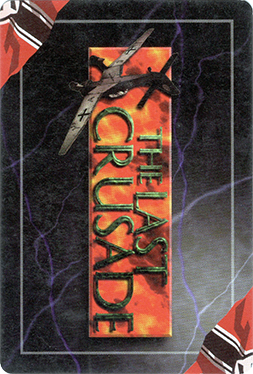
The Last Crusade is an out-of-print collectible card game originally published in December 1995 by Virginia-based Chameleon Eclectic Entertainment until the company closed in early 1999, at which time Pinnacle Entertainment Group took over production.
Card advantage is a term used in collectible card game strategy to describe the state of one player having access to more cards than another player, usually by drawing more cards through in-game effects to increase the size of their hand. Although it applies to several collectible card games, the concept was first described early in the evolution of Magic: The Gathering strategy, where many early decks relied on a player drawing more cards than their opponent, and then using this advantage to play more cards and advance their position faster than their opponent. By 2007 it was recognized as one of the most important indicators of who is ahead in a game and has been utilized in the development of strategy for nearly every collectible card game created.
Civilization: The Card Game is a card game designed by Civilization IV lead designer Soren Johnson, based on Civilization IV. It was developed in 2006 by Firaxis Games, as a bonus in the Sid Meier's Civilization Chronicles boxed set, and is not available independently.

Magic: The Gathering – Duels of the Planeswalkers is a video game based on the popular collectible card game of the same name, published by Wizards of the Coast. It was released on June 17, 2009.

A game is a structured type of play, usually undertaken for entertainment or fun, and sometimes used as an educational tool. Many games are also considered to be work or art.

Jack Change It is a simple card game of the Crazy Eights family that is popular among children. It is usually played by two to six players, although theoretically it can be played with up to ten. This game is a shedding-type card game, the purpose being for a player to be the first to discard all of their cards.
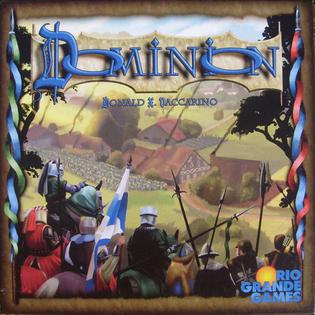
Dominion is a card game created by Donald X. Vaccarino and published by Rio Grande Games. Originally published in 2008, it was the first deck-building game, and inspired a genre of games building on its central mechanic. Each player begins with a small deck of cards, which they improve by purchasing cards from a common supply that varies from game to game. Cards can help the player's deck function, impede their opponents, or provide victory points. As of December 2022, fifteen expansions to the original Dominion have been released.
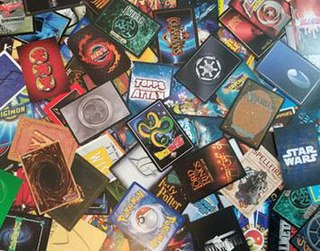
A collectible card game (CCG), also called a trading card game (TCG) among other names, is a type of card game that mixes strategic deck building elements with features of trading cards. It was introduced with Magic: The Gathering in 1993.
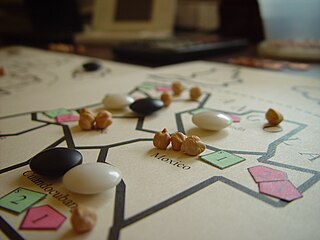
Game design is the process of creating and shaping the mechanics, systems and rules of a game. Games can be created for entertainment, education, exercise or experimental purposes. Additionally, elements and principles of game design can be applied to other interactions, in the form of gamification. Game designer and developer Robert Zubek defines game design by breaking it down into its elements, which he says are the following:

Hearthstone is a digital collectible card game released by Blizzard Entertainment in 2014, available for Microsoft Windows and macOS PCs and iOS and Android smartphones. The game is free-to-play, with players gaining in-game currency and card packs via winning matches and completing quests, while real-world money can be spent to acquire additional card packs and cosmetic items. The game has been critically well-received and financially successful, estimated in August 2017 to earn nearly US$40 million per month. As of November 2018, Blizzard has reported more than 100 million Hearthstone players. Blizzard has continued to expand the game with the addition of multiple expansions, adventures and game modes.














